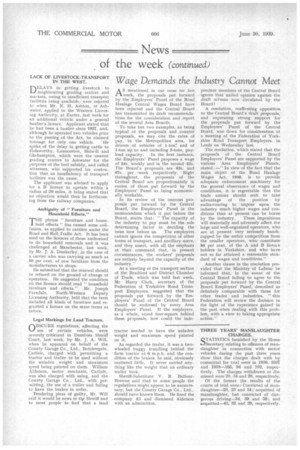LACK OF I L N W I EZO L TRANSFORT r Wage Demands the Industry Cannot Meet A S
Page 54

If you've noticed an error in this article please click here to report it so we can fix it.
mentioned in our issue for last week, the proposals put forward by the Employers' Panel of the Road Haulage Central Wages Board have been rejected and the Central Board has transmitted its draft recommendations for the consideration and report of the several Area Boards.
To take but two examples, as being typical of the proposals and counter proposals, we may cite the rates of pay, in the Metropolitan area, for drivers of vehicles of 1-ton7 and of 1-ton up to and including 2-tons, pay load capacity. In the first instance, the Employers' Panel proposes a wage of 54s. weekly and in the second 62s. The Board's proposals are 635. and 67s. per -week respectively. Right throughout, the proposals of the Central Board are proportionately in excess of those put forward by the Employers' Panel as being economically workable.
In its review of the onerous proposals put forward by the Central Board, the Employers' Panel in the memorandum which it put before the Board, states that: "The capacity of the industry to pay must be the sole determining factor in deciding the issue now before us. The employers cannot ignore the competition of other forms of transport, and ancillary users, and they assert, with all the emphasis at their command that, in present circumstances, the workers' proposals are entirely beyond the capacity of the industry."
At a meeting of the transport section of the Bradford and District Chamber of Trade, which was held last week, Mr Harry Clark, secretary of the Federation of Yorkshire Road Transport Employers, suggested that the proposals put forward by the Employers' Panel of the Central Board should be endorsed by every Area Employers' Panel. If the employers, as a whole, stood four-square behind these proposals, how could the lade pendent members of the Central Board ignore that united opinion against the draft sci-eme now circulated by the Board?
A resolution, reaffirming opposition to the Central Board's draft proposals, and expressing strong support for the proposals put forward by the Employers' Panel of the Central Board, was down for consideration at a meeting of the Federation of Yorkshire Road Transport Employers. in Leeds on Wednesday last The resolution, which stated that the proposals of the Central Board Employers' Panel are supported by the various Area Employers' Panels, stated :—" In view of the fact that the main object of the Road Haulage Wages Act, 1938, is to provide adequate enforcement machinery for the general observance of wages and conditions, it is regrettable that the trade unions should seek to take advantage of the position by endeavouring to impose upon the industry much higher wages and conditions than at present can be borne by the industry. These impositions will materially and adversely affect the large and well-organized operators, who are at present very seriously handicapped by the unfair competition from the smaller operators, who constitute 80 per cent, of the A and B IiceaLe holders in Yorkshire, and who have not so far attained a reasonable standard of wages and conditions."
Another clause in the resolution provided that the Ministry of Labour be informed that, in the event of the Central Board failing to agree to the proposals put forward by the Central Board Employers' Panel, described as definitely comparable with those for other trades and industries, " this Federation will review the decision in the light of the experience gained in the past when dealing with this problem, with a view to taking appropriate action."




































































































































